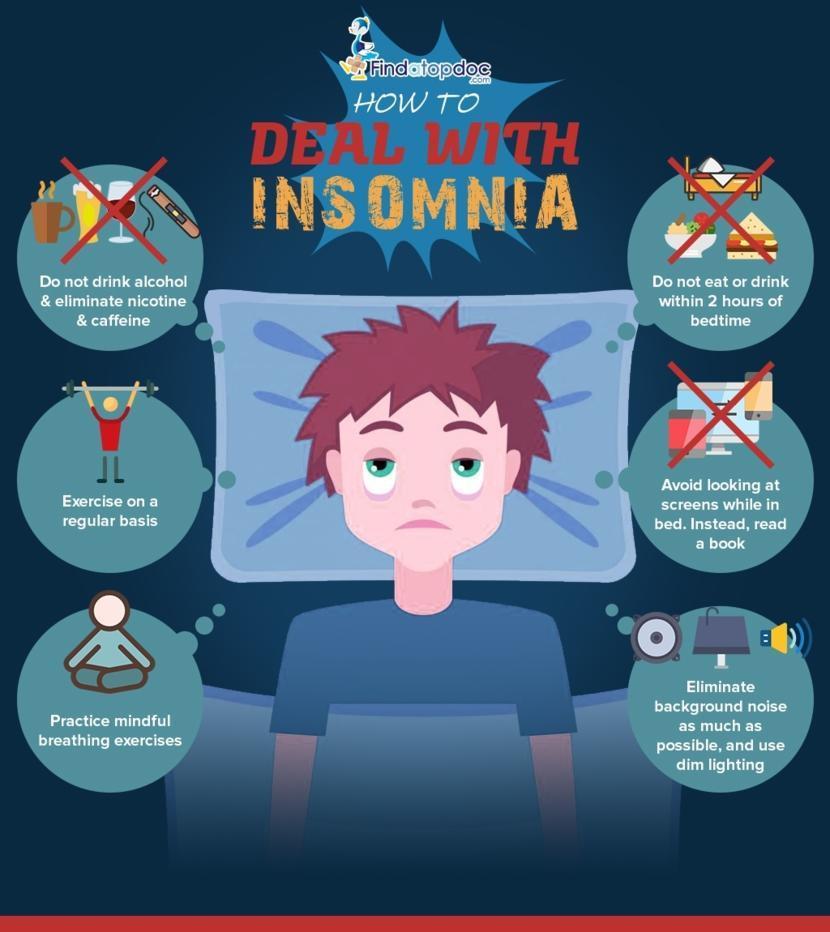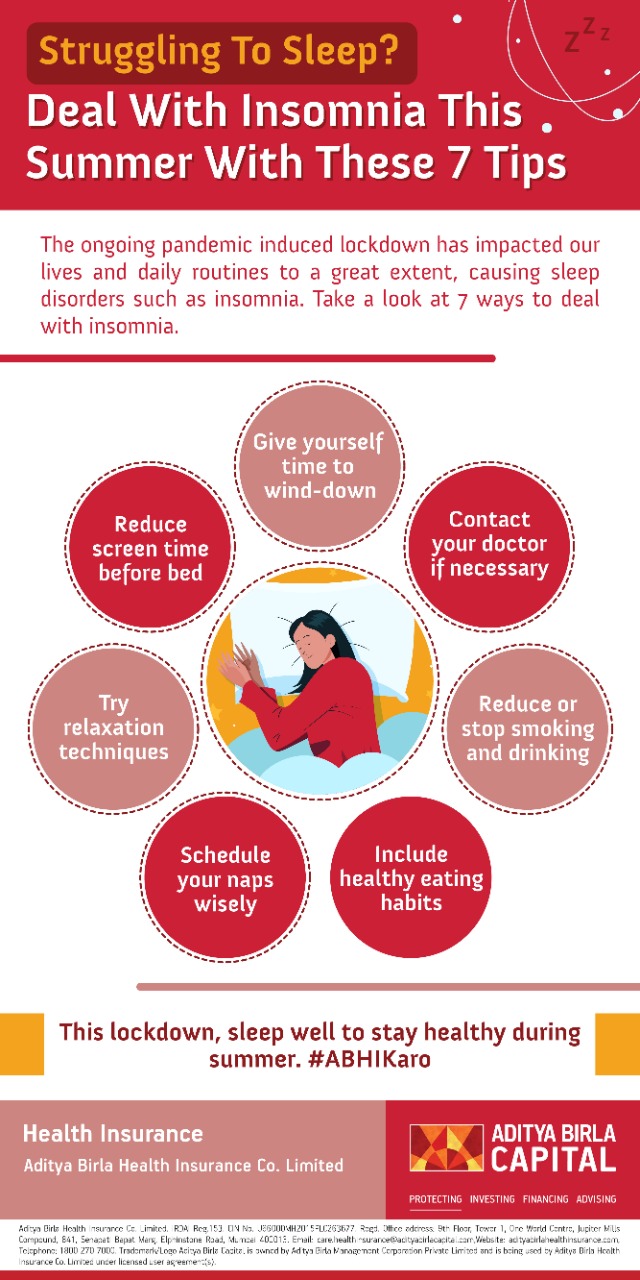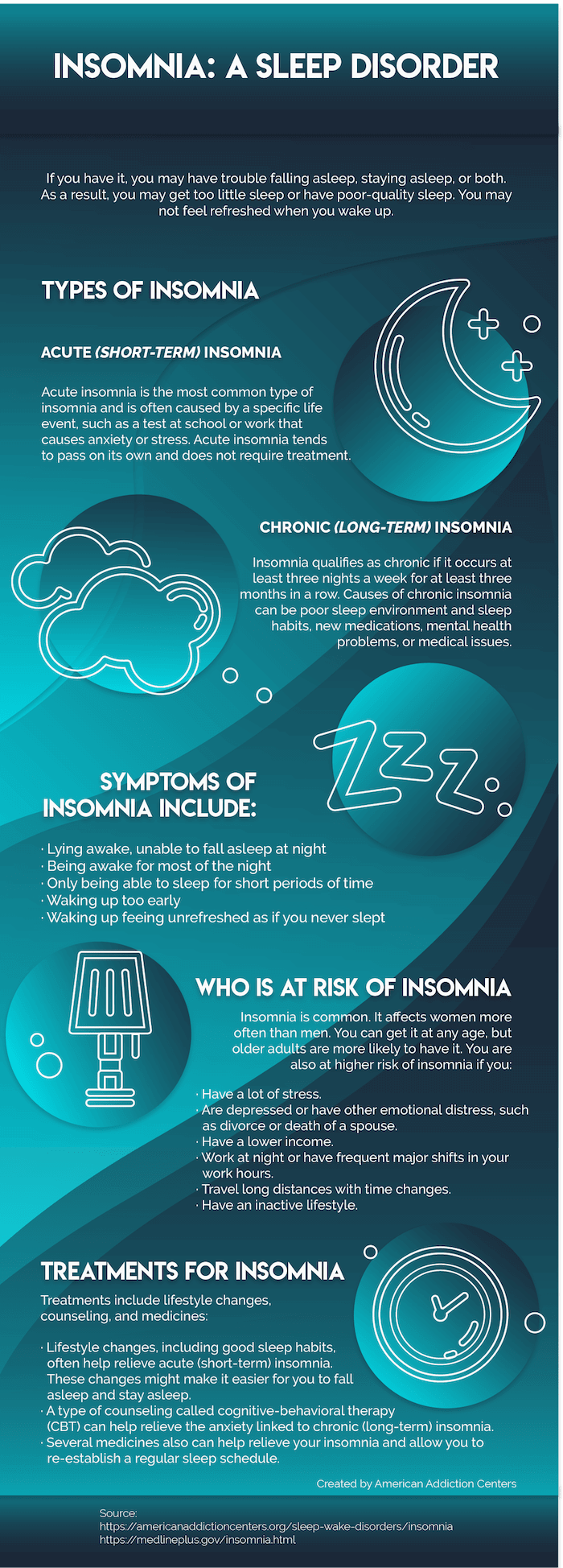How to Deal With Insomnia
To deal with insomnia, establish a regular sleep schedule and create a relaxing bedtime routine. Insomnia, characterized by difficulty falling asleep or staying asleep, affects a significant portion of the population.
However, finding effective strategies to manage this sleep disorder can greatly improve one's quality of life. Establishing a regular sleep schedule and creating a relaxing bedtime routine are two key steps in dealing with insomnia. Going to bed and waking up at consistent times helps regulate the body's internal clock, promoting better sleep.
Additionally, engaging in relaxing activities before bedtime, such as reading or taking a bath, signals the body to wind down and prepare for sleep. By implementing these strategies, individuals can find relief from insomnia and achieve a more restful night's sleep.

Credit: www.findatopdoc.com
Understanding Insomnia
Insomnia is a common sleep disorder that affects many individuals. It is characterized by difficulty falling asleep or staying asleep, leading to inadequate rest. Understanding insomnia is crucial in managing this condition effectively. So, what is insomnia? Insomnia is the inability to get sufficient sleep, resulting in daytime fatigue, irritability, and difficulty concentrating. There are several potential causesof insomnia. These include lifestyle factors such as high stress levels, irregular sleep schedule, or excessive consumption of caffeine. Medical conditions like chronic pain, depression, or anxiety can also contribute to insomnia. Additionally, certain medications or substance abuse can disrupt sleep patterns. Insomnia can be broadly classified into three types. Acute insomnia is short-term and often caused by significant life events or stress. Chronic insomnia, on the other hand, persists for a longer duration and is characterized by consistent difficulty in sleeping. Lastly, comorbid insomnia refers to insomnia that occurs in conjunction with other medical or psychiatric conditions. Understanding the different types of insomnia can help guide appropriate treatment strategies.

Credit: www.adityabirlacapital.com
Tips For Improving Sleep
1. Establish a bedtime routine: Creating a consistent schedule can signal your body that it's time to wind down. Try relaxation techniques like deep breathing or reading a book before sleep.
2. Create a sleep-friendly environment: Make your bedroom a comfortable place to sleep. Keep it dark, quiet, and at a cool temperature. Invest in a supportive mattress and pillows.
3. Manage stress and anxiety: Stress can interfere with sleep. Practice stress-reducing activities such as yoga or meditation. Keep a journal to write down worries before bed.
4. Limit caffeine and electronics: Avoid caffeine or large meals close to bedtime. Electronic devices emit blue light that can disrupt sleep. Aim to turn them off at least one hour before sleep.
Seeking Professional Help
Dealing with insomnia can be challenging, but seeking professional help can provide relief. The first step is to know when to consult a doctor. If you have trouble falling asleep or staying asleep for more than a few weeks, it's time to seek evaluation and diagnosis. A medical professional will assess your medical history, sleep patterns, and may suggest further tests to rule out any underlying conditions. Once diagnosed, various treatment options can be explored. These range from lifestyle changes, such as maintaining a regular sleep schedule and avoiding stimulants, to cognitive-behavioral therapy and medication. Your doctor will work with you to determine the most suitable approach based on your specific needs. Remember, addressing insomnia with professional help can significantly improve your sleep quality and overall well-being.

Credit: americanaddictioncenters.org
Frequently Asked Questions Of How To Deal With Insomnia
Can Meditation Help With Insomnia?
Yes, meditation can be helpful in improving sleep quality and reducing insomnia. By practicing mindfulness and relaxation techniques, meditation can calm the mind, reduce stress, and promote a state of relaxation that aids in falling asleep and staying asleep throughout the night.
What Are The Potential Causes Of Insomnia?
Insomnia can be caused by various factors such as stress, anxiety, depression, certain medications, caffeine, alcohol, irregular sleep schedule, and underlying medical conditions. Identifying and addressing the root cause is crucial in finding effective ways to deal with insomnia.
How Can A Bedtime Routine Improve Sleep Quality?
Establishing a consistent bedtime routine sends signals to the body that it's time to wind down and prepare for sleep. Activities like avoiding screens, doing relaxation exercises, reading a book, or taking a warm bath can help relax the mind and body, making it easier to fall asleep and maintaining sleep throughout the night.
Is Exercise Beneficial For Sleep?
Yes, regular exercise has been shown to improve sleep quality. Engaging in physical activity during the day can help reduce stress and anxiety, promote relaxation, and tire the body, making it easier to fall asleep at night. However, it's important to avoid vigorous exercise close to bedtime as it may interfere with sleep.
Conclusion
Dealing with insomnia requires a comprehensive approach that addresses not just the symptoms but the underlying causes as well. By adopting healthy sleep habits, practicing relaxation techniques, and seeking professional help if needed, you can regain control over your sleep and improve your overall well-being.
Remember, consistency and patience are key when it comes to conquering insomnia. Restful nights are within your grasp!
Comments
Post a Comment